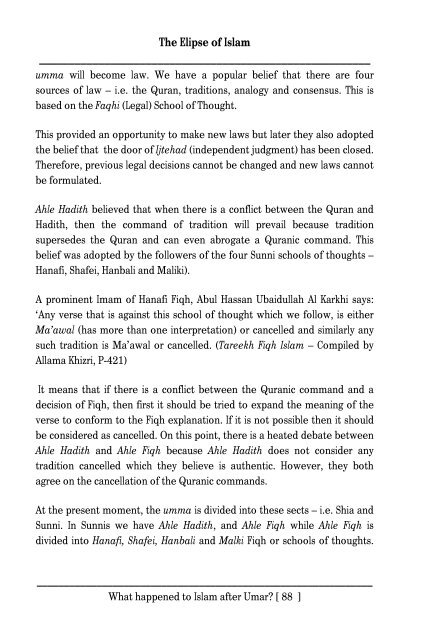The-Eclipse-of-Islam-What-happend-to-Islam-after-Umar-by-G-A-Parwez-Tolue-Islam-Trust
The-Eclipse-of-Islam-What-happend-to-Islam-after-Umar-by-G-A-Parwez-Tolue-Islam-Trust
The-Eclipse-of-Islam-What-happend-to-Islam-after-Umar-by-G-A-Parwez-Tolue-Islam-Trust
You also want an ePaper? Increase the reach of your titles
YUMPU automatically turns print PDFs into web optimized ePapers that Google loves.
<strong>The</strong> Elipse <strong>of</strong> <strong>Islam</strong>________________________________________________________umma will become law. We have a popular belief that there are foursources <strong>of</strong> law – i.e. the Quran, traditions, analogy and consensus. This isbased on the Faqhi (Legal) School <strong>of</strong> Thought.This provided an opportunity <strong>to</strong> make new laws but later they also adoptedthe belief that the door <strong>of</strong> Ijtehad (independent judgment) has been closed.<strong>The</strong>refore, previous legal decisions cannot be changed and new laws cannotbe formulated.Ahle Hadith believed that when there is a conflict between the Quran andHadith, then the command <strong>of</strong> tradition will prevail because traditionsupersedes the Quran and can even abrogate a Quranic command. Thisbelief was adopted <strong>by</strong> the followers <strong>of</strong> the four Sunni schools <strong>of</strong> thoughts –Hanafi, Shafei, Hanbali and Maliki).A prominent Imam <strong>of</strong> Hanafi Fiqh, Abul Hassan Ubaidullah Al Karkhi says:‘Any verse that is against this school <strong>of</strong> thought which we follow, is eitherMa’awal (has more than one interpretation) or cancelled and similarly anysuch tradition is Ma’awal or cancelled. (Tareekh Fiqh <strong>Islam</strong> – Compiled <strong>by</strong>Allama Khizri, P-421)It means that if there is a conflict between the Quranic command and adecision <strong>of</strong> Fiqh, then first it should be tried <strong>to</strong> expand the meaning <strong>of</strong> theverse <strong>to</strong> conform <strong>to</strong> the Fiqh explanation. If it is not possible then it shouldbe considered as cancelled. On this point, there is a heated debate betweenAhle Hadith and Ahle Fiqh because Ahle Hadith does not consider anytradition cancelled which they believe is authentic. However, they bothagree on the cancellation <strong>of</strong> the Quranic commands.At the present moment, the umma is divided in<strong>to</strong> these sects – i.e. Shia andSunni. In Sunnis we have Ahle Hadith, and Ahle Fiqh while Ahle Fiqh isdivided in<strong>to</strong> Hanafi, Shafei, Hanbali and Malki Fiqh or schools <strong>of</strong> thoughts.______________________________________________________________<strong>What</strong> happened <strong>to</strong> <strong>Islam</strong> <strong>after</strong> <strong>Umar</strong>? [ 88 ]


